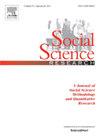Groups activate identities; identities activate behavior: How political homogeneity breeds extremism and apathy in American politics
IF 3.5
2区 社会学
Q1 SOCIOLOGY
引用次数: 0
Abstract
Dominant accounts of partisan polarization in political science and psychology posit that misunderstandings and mutual animosity drive conflict between Democrats and Republicans. Despite such high-profile tension, many Americans remain disengaged from politics. Using Identity Theory in sociology, we account for both rising polarization and persistent disengagement by turning attention to internal party dynamics. Partisan politics operates differently, depending on the political makeup of commonplace fixed social groups like sets of friends and coworkers. Partisan politics creates relatable common ground when social groups are politically homogeneous but creates tension in politically diverse small groups. Under these conditions, social similarity fosters more political activity generally (both normative and extreme), while deterring political engagement among those in politically diverse groups. Analyses of an original quota-sampled survey and a representative panel survey support expectations. Political homogeneity strengthens political identities, which produces more role-typical behaviors and extreme attitudes. These findings show how the desire to preserve relationships increases polarization, while also maintaining political disengagement.
群体激活身份;身份激活行为:政治同质化如何在美国政治中滋生极端主义和冷漠
政治科学和心理学中关于党派分化的主流说法认为,误解和相互仇恨导致了民主党和共和党之间的冲突。尽管如此高调的紧张局势,许多美国人仍然远离政治。利用社会学中的身份理论,我们通过将注意力转向党内动态来解释两极分化的加剧和持续的脱离。党派政治的运作方式不同,取决于普通的固定社会群体的政治构成,比如一群朋友和同事。当社会群体在政治上同质时,党派政治创造了相关的共同点,但在政治上多样化的小群体中却产生了紧张关系。在这种情况下,社会相似性通常会促进更多的政治活动(包括规范的和极端的),同时阻碍政治多元化群体中的政治参与。对原始配额抽样调查和代表性小组调查的分析支持预期。政治同质化强化了政治认同,产生了更多的角色典型行为和极端态度。这些发现表明,保持关系的愿望如何加剧了两极分化,同时也保持了政治脱离。
本文章由计算机程序翻译,如有差异,请以英文原文为准。
求助全文
约1分钟内获得全文
求助全文
来源期刊

Social Science Research
SOCIOLOGY-
CiteScore
4.30
自引率
4.00%
发文量
0
审稿时长
65 days
期刊介绍:
Social Science Research publishes papers devoted to quantitative social science research and methodology. The journal features articles that illustrate the use of quantitative methods in the empirical solution of substantive problems, and emphasizes those concerned with issues or methods that cut across traditional disciplinary lines. Special attention is given to methods that have been used by only one particular social science discipline, but that may have application to a broader range of areas.
 求助内容:
求助内容: 应助结果提醒方式:
应助结果提醒方式:


